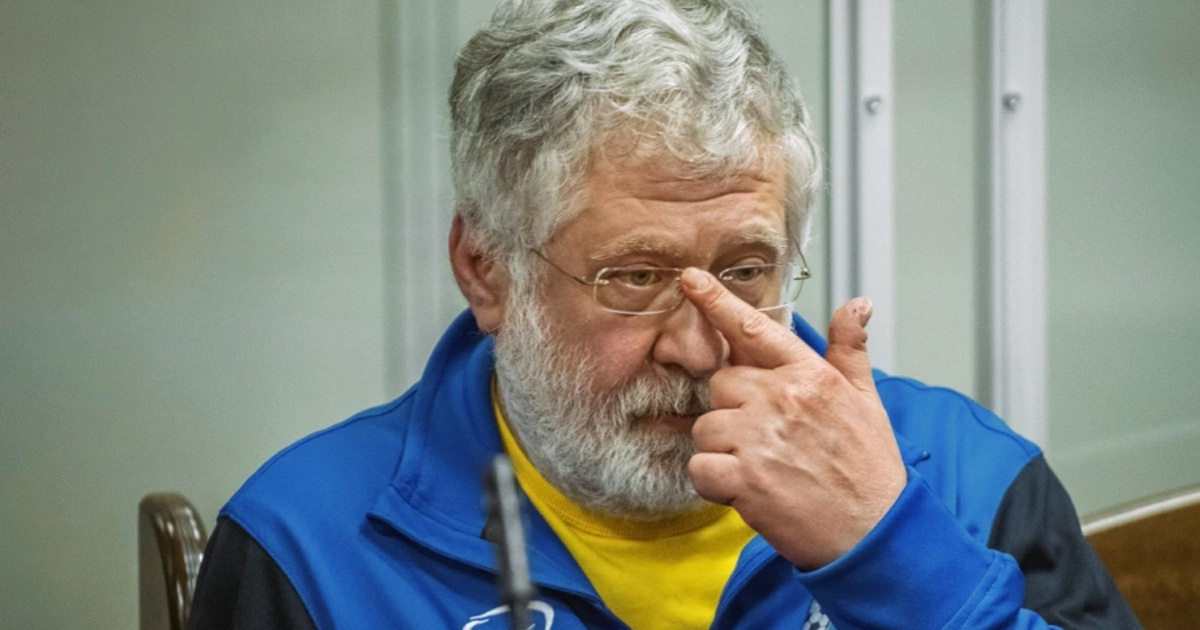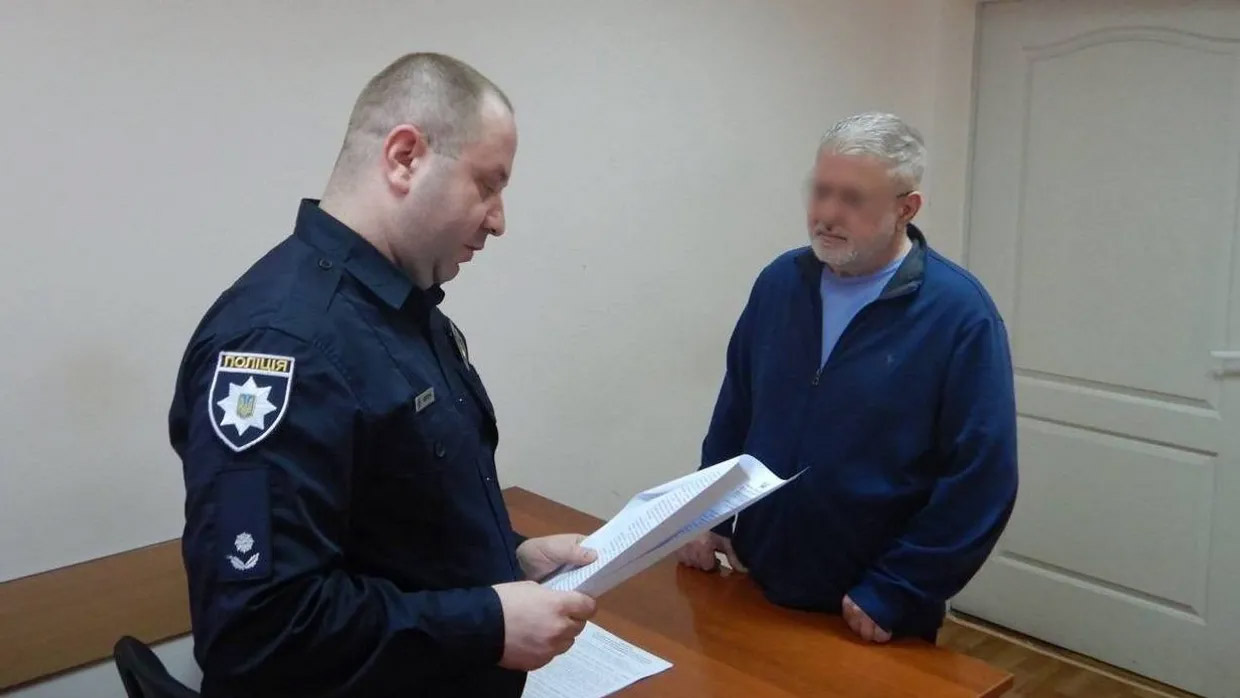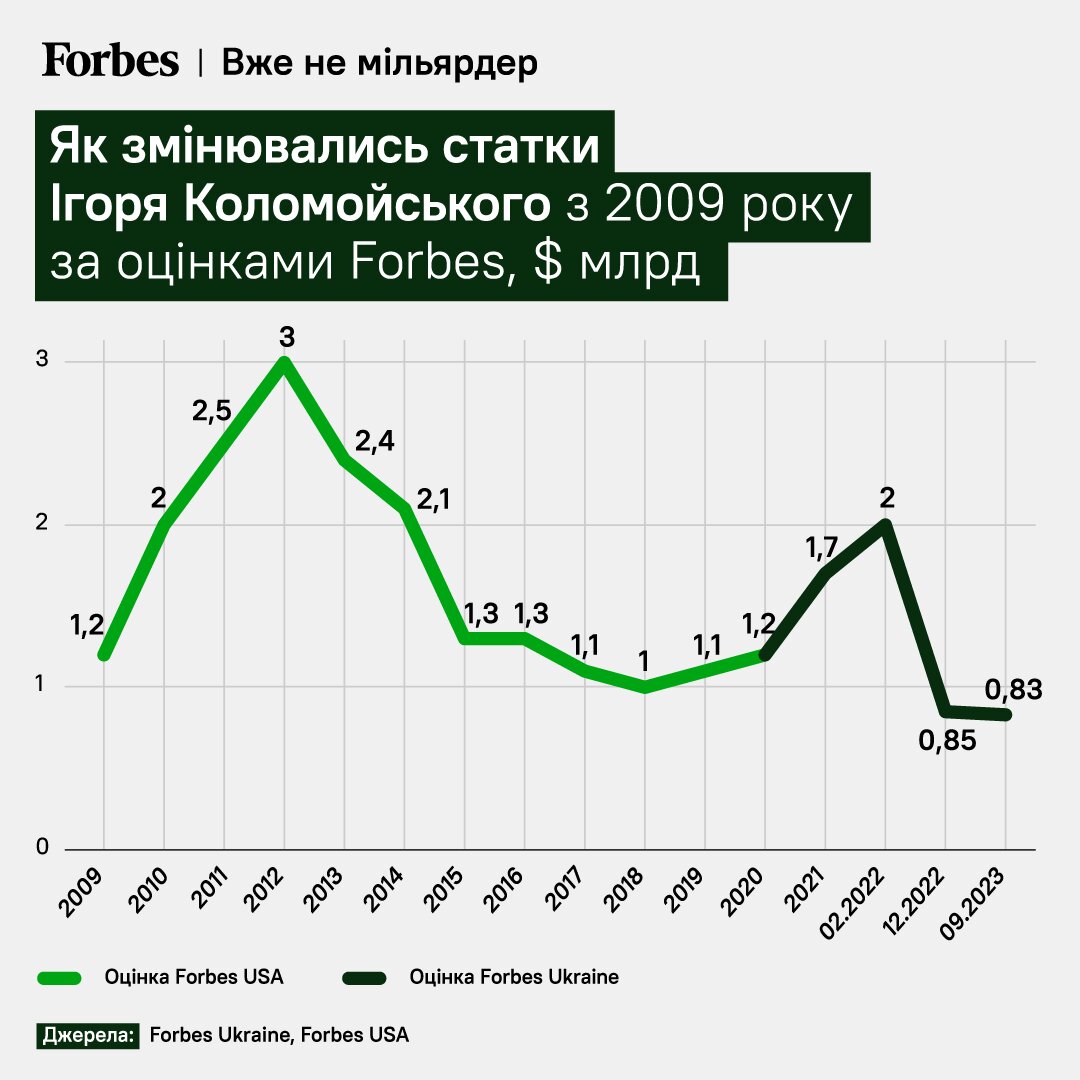Kolomoisky: the conversation continues

The authorities have played their final and decisive card in negotiations with the disgraced oligarch by reviving old charges against co-owner of the Privat group, Ihor Kolomoisky. However, whether this will lead to the desired outcome remains a big question.
"Ace up the sleeve" or "skeleton in the closet"?
Kolomoisky received his first suspicion from law enforcement on September 2 last year, accused of fraud and laundering UAH 509 million of criminal proceeds. A week later, he was additionally charged with embezzling UAH 5.8 billion UAH from the then-controlled Privatbank.
According to the investigation, this money was stolen through the fictitious deposit of cash into the bank's vault. The total damage from Kolomoisky's actions subsequently increased to UAH 9.2 billion.
Since September 2, he has been held in the SBU pre-trial detention center by court order, with the bail amount increasing from UAH 509 million under the first charge to UAH 3.891 billion. Eight months have passed since then, but there has been no progress on these cases.
The court regularly extends the suspect's detention (most recently on April 22, until June 2), gradually reducing the bail to UAH 1.96 billion.
For context, the investigation does not involve gathering evidence of the crime. In this case, it is the preliminary work of the operational officers from the relevant SBU units, the Bureau of Economic Security, and NABU.
The investigator's task is straightforward: to legally formalize the available evidence and present it to the court. The fact that this has not been done in eight months raises questions about the strength of the prosecution's case. Is there a solid evidentiary base at all? No court would dare to deliver a guilty verdict based solely on the previously mentioned scheme.
Further indicating the apparent stalling of the investigative process is the decision of the High Anti-Corruption Court (HACC) on September 21, 2023, which lifted the asset seizure imposed on Kolomoisky on September 8, almost immediately after the suspicion was announced.
The discussion was about shares in the charter capital of 307 companies with a total nominal value of over UAH 3 billion, as well as nearly 1,000 real estate properties and more than 1,600 cars, planes, and yachts. The HACC Appeals Chamber confirmed the legitimacy of this decision on November 28.
According to the court's conclusions, the investigation's deadline expired in May 2023. On this basis, the seizure was also lifted from the property of other defendants, including Kolomoisky's top manager, former chairman of Privatbank Oleksandr Dubilet.
These are the prerequisites for the involvement of the National Police in the "Kolomoisky issue". On May 8, the National Police announced to the detainee a suspicion of organizing a contract killing.

A National Police investigator reads Kolomoisky the new suspicion
It is evident that if the HACC was correct (and most likely it is) and the statute of limitations for the embezzlement from Privatbank has expired, it would be easy for the oligarch's lawyers to "collapse" this case in court. And it would inevitably reach the court since it is impossible to indefinitely extend the pre-trial detention of a suspect.
The situation is entirely different with the contract killing. Firstly, there is no statute of limitations. Secondly, within the framework of such an investigation, the suspect cannot be released on bail. This means, on the one hand, he is now "secured" much more reliably than before.
On the other hand, there are significant doubts that this "skeleton in the closet" will turn into an "ace up the sleeve" in the behind-the-scenes dialogue between the authorities and the disgraced oligarch (and this dialogue is surely ongoing).
The new accusation dates back to events from 2003. According to the investigation, at that time, Kolomoisky, in a struggle for control over the Zaporizhzhia plant Dniprospetsstal, threatened lawyer S. Karpenko with death, demanding the annulment of the shareholders' meeting decisions.
After the lawyer refused, he was indeed attacked by unknown assailants who stabbed him several times and hit him with an iron rod as he exited a store. The attackers were prevented from finishing him off by the lawyer's wife, who was nearby.
The police found out that the attack was organized by one Serhiy Nikitin, Kolomoisky's personal bodyguard. However, linking his actions to Kolomoisky is very difficult because Nikitin was killed a few weeks after the incident, and later his killer was also found dead.
Nonetheless, in the summer of 2005, just two years later, the General Prosecutor's Office of Ukraine (GPO) initiated a criminal case against Kolomoisky, accusing him of organizing a contract killing. However, it almost immediately closed the case, citing "the absence of a crime".
Representatives of the oligarch Viktor Pinchuk (who was involved in legal disputes with Kolomoisky at that time) claimed at a session of the High Court in London that Kolomoisky "resolved" the issue with the then-head of the GPO, Sviatoslav Piskun, for $50 million.
Whatever the truth, the case against the co-owner of the Privat group was indeed closed on Piskun's orders, notes former Verkhovna Rada deputy Serhiy Leshchenko. The GPO investigator Ihor Sholodko, who had opened and closed the case, allegedly died while defending Donetsk airport in 2014 under very mysterious circumstances.
A year later, in 2015, the GPO reopened the materials from the archive. The resumption of the investigation into Kolomoisky coincidentally aligned with the escalation of his conflict with then-President Petro Poroshenko.
It is evident that the revival of the case ultimately led to its closure again, as it was only "remembered" once more after another nine (!) years.
"1+1" or Kryvyi Rih Iron Ore Plant?
Thus, the prospects of this criminal case are very unclear, considering it has been opened and closed twice before, and key figures are deceased. So why have the authorities revisited this "skeleton in the closet"?
"Since we live in Ukraine, not somewhere in Sweden, there are reasons to believe that this 'argument' was brought against Kolomoisky for a purpose. Maybe to get him to give up '1+1' TV channel or some shares in other companies. For example, in 'Dniprospetsstal' or the Kryvyi Rih Iron Ore Plant (KRIOP - author)", - speculates Ukrainian corruption researcher and blogger Yuriy Nikolov.
So, if we take this version as a basis, how might the disgraced oligarch "resolve the issue" this time? Analysis shows that there are few options. According to business media calculations, Kolomoisky is now "poorer" than ever before.

How has Kolomoisky's fortune changed since 2009, according to Forbes estimates, $ billion
Previously, he lost his most significant assets, Privatbank and shares in the companies PJSC "Ukrnafta" and JSC "Ukrtatnafta" (Kremenchuk Oil Refinery). These were nationalized: Privatbank in December 2016, "Ukrnafta" and "Ukrtatnafta" in November 2022.
Of the major industrial assets, the co-owner of the Privat group still has "DniproAzot" and several electrometallurgical enterprises: the aforementioned "Dniprospetsstal", ferroalloy plants in Nikopol and Zaporizhzhia, and mining and processing plants in Pokrov and Marhanets (the Dnipropetrovsk oblast). He also holds a stake in KRIOP.
Earlier, OstroV noted that the ferroalloy industry enterprises stopped almost immediately after their owner's arrest. Since then, they have not resumed operations. According to their managers, there are no clear plans to restart production.
The main reason cited by the administration is the high cost of electricity. "There is hope that the Ministry of Economy, together with NEC 'Ukrenergo', will develop a program for supplying resources to the metallurgical complex under a long-term contract, that is, at a fixed cost. But for now, this is just hope", - said V. Bondarets, the technical director of the Pokrov Mining and Processing Plant, in early April.
At this point, it can be stated that this hope died after the massive missile strikes by the russians on Ukrainian power plants in April. As a result of these strikes, a deficit arose in the energy system, forcing "Ukrenergo" to reinstate forced outages for industrial enterprises during peak hours. Obviously, under these conditions, there can be no talk of a fixed (read: preferential) price for electricity for metallurgists. The same applies to "Dniprospetsstal". This means that if the state nationalizes these assets, it will not be able to ensure their operation, nor will a new private owner.
"DniproAzot" is also not of interest to the state. It owns another large producer of mineral fertilizers, the Odesa Port Plant, which halted operations long before the war started. The question is: why would the state need another idle enterprise (i.e., one generating losses)?
Kolomoisky still has shares in several regional electricity distribution companies: "Poltavaoblenergo", "Chernihivoblenergo", "Sumyoblenergo" and "Dniprooblenergo". Earlier, President Zelensky spoke about the possibility of nationalizing energy companies since they have strategic significance.
Moreover, the distribution and supply of electricity were highly profitable businesses in Ukrainian conditions. They were, until the energy facilities became targets of russian missile strikes. Now, there is only a high chance of inheriting losses amounting to hundreds of millions of hryvnias from the destruction of the grid infrastructure.
Finally, Kolomoisky's controlled largest Ukrainian airline, UIA, ceased flights after the start of the full-scale war. Among the "blue chips" remaining with the oligarch are only KRIOP and the TV channel "1+1" (LLC "Television and Radio Company "Studio "1+1").
The latter is important not so much as a business project generating profit, but as one of the most powerful platforms for shaping public opinion. That is, its political value clearly outweighs its economic value. Undoubtedly, this is an asset very interesting to the authorities.
But is the co-owner of Privat ready to part with it after the announcement of new/old suspicions? Apparently, he is not. Not at all. His principled position is indicated, first of all, by his refusal to be released on bail when such an opportunity existed.
"I think the prosecution would very much like to shift responsibility after the bail is paid. Therefore, we are not even considering this question", - the oligarch's lawyer, A. Lysak, previously explained to the media.
Secondly, Kolomoisky understands how problematic (to put it mildly) it would be to convince the court of his involvement in the attempted murder. The author managed to find in an open source the text of a resolution by the senior investigator of the GPO, I. Sholodko, dated June 30, 2005.
The document details the circumstances of the attack on S. Karpenko in Feodosia. It also mentions threats against him from Kolomoisky and that the oligarch allegedly instructed his personal bodyguard, S. Nikitin, to eliminate the unwanted lawyer.
But there are no references to the evidence supporting these accusations. This is precisely what the lawyers of the former owner of Privatbank are focusing on.
"The petition materials do not contain any evidence confirming that the suspect gave any instructions or orders constituting the objective side of the corresponding criminal offense, namely the instruction to organize the commission of this particularly serious crime", - says a statement to the media published on May 9.
The defense representatives also remind that according to Part 5, Article 95 of the Criminal Procedure Code of Ukraine, "a person gives testimony about facts that he personally perceived, except as provided by this Code".
"At the same time, none of the witnesses was personally present at the time and place where, according to the prosecution, I. Kolomoisky allegedly gave the order to commit the crime. Their judgments about the circumstances of the case are based solely on their subjective assumptions", - the statement emphasizes.
Thus, saying that now, after the announcement of a new and more serious suspicion, the oligarch is "standing on burning ground" would be a great exaggeration.
By Vitaliy Krymov, OstroV
